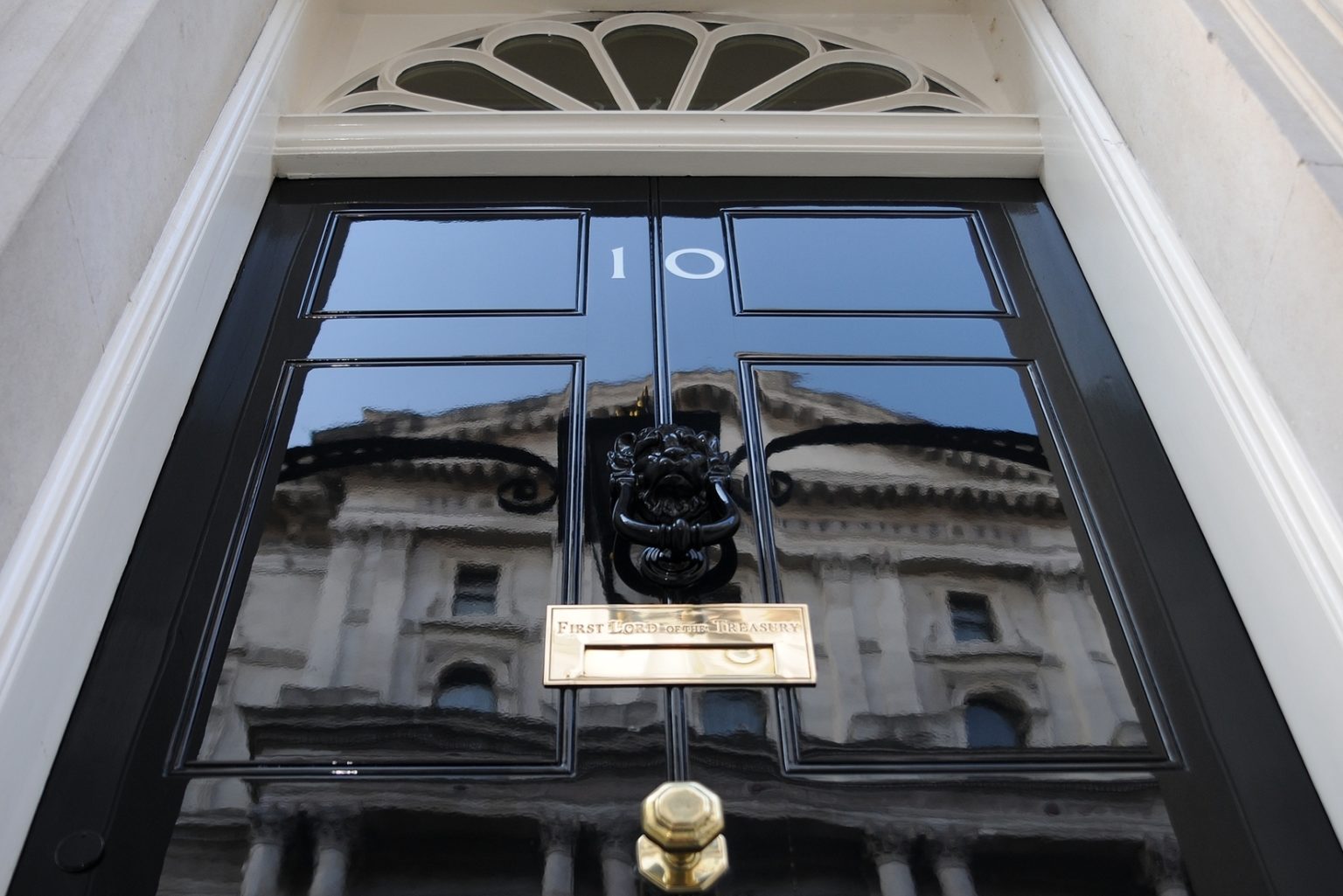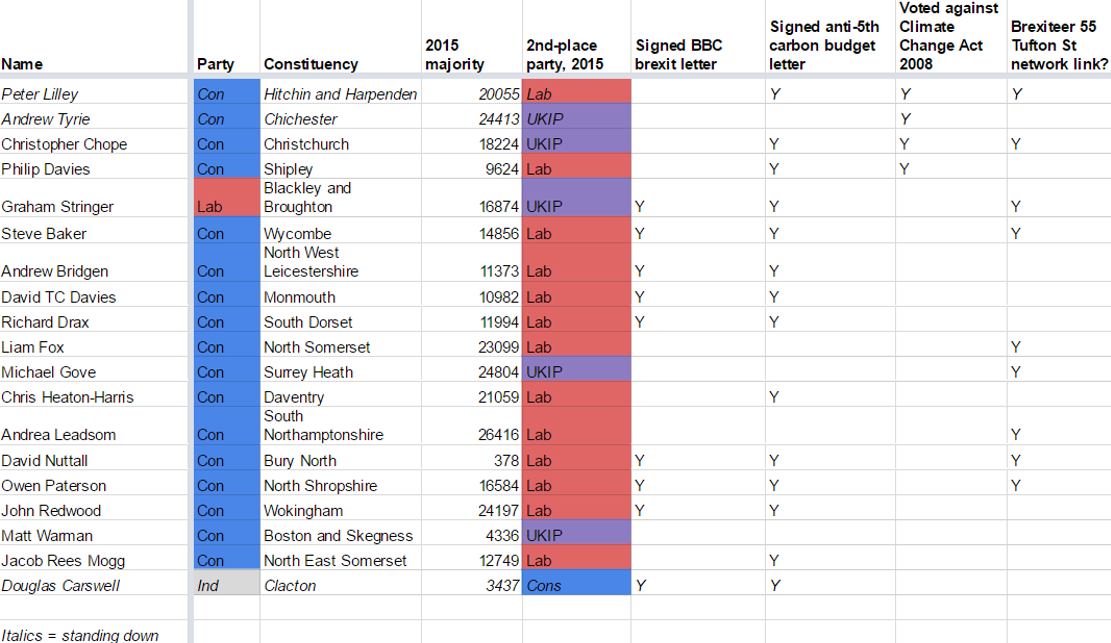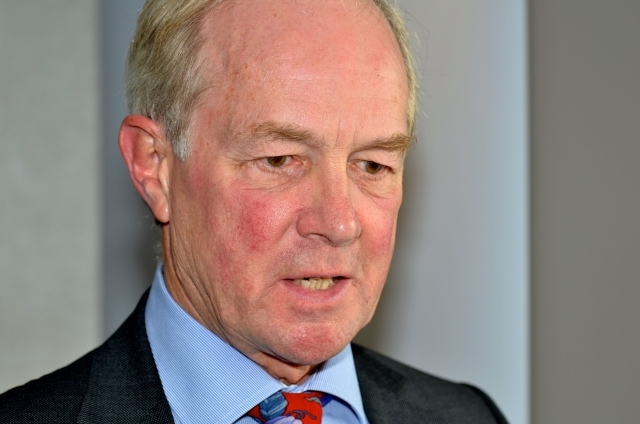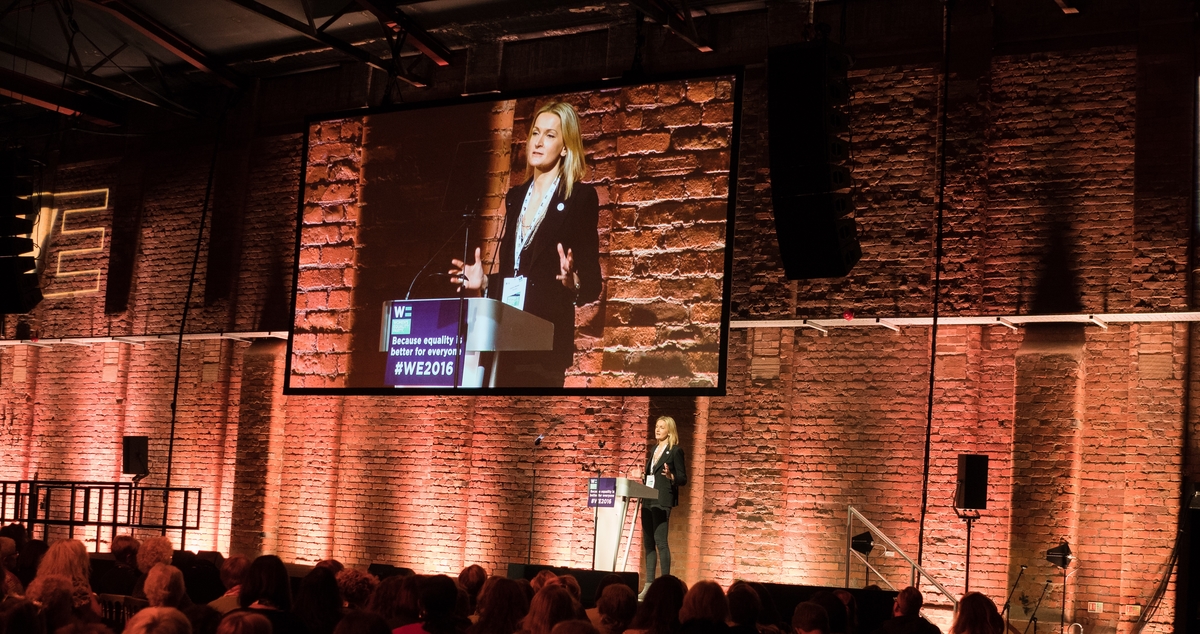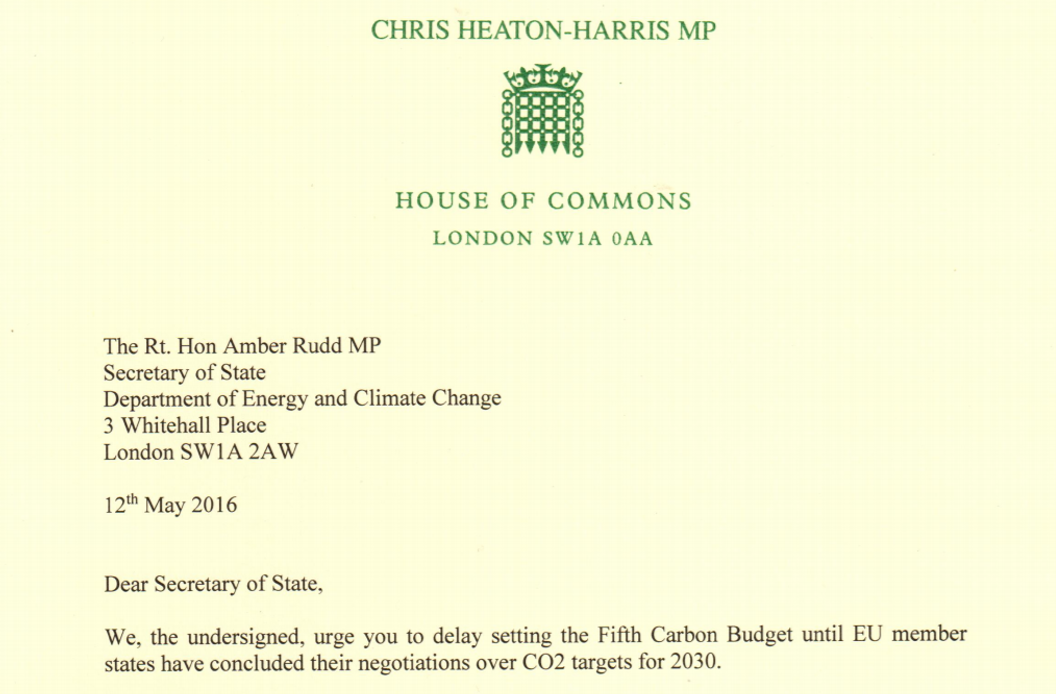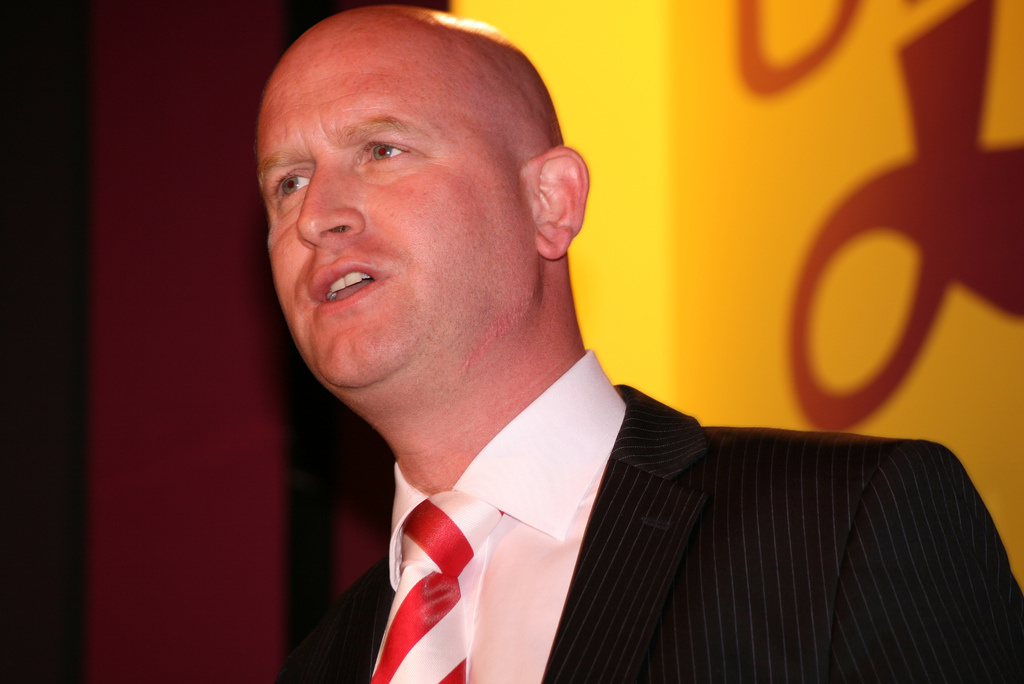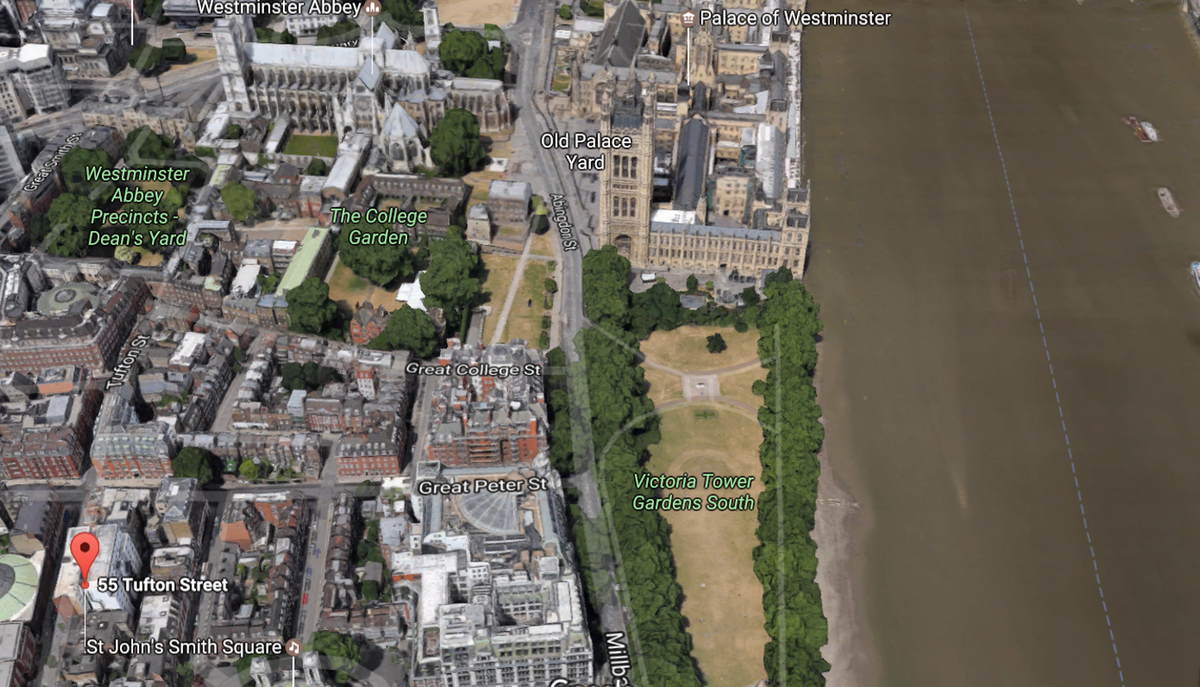Climate change is unlikely to be a big-ticket item for any party this general election. But in some constituencies, voters have a stark choice between candidates that want to tackle climate change and those that deny the seriousness of the issue.
DeSmog UK outlines the key battlegrounds for voters that care about the representation of climate science in Westminster.
Are there any candidates you think DeSmog UK should be investigating? Email any tips to [email protected] or use the details on our About Us page to contact our editors securely.
And Then There Were Two… Climate Change Act Naysayers
The UK government is legally required to cut the country’s emissions thanks to the Climate Change Act. Parliament passed the law in 2008, with 463 MPs voting for it. Only five MPs voted nay.
One of the five – Anne Widdecombe – left parliament in 2010 and was last spotted treading the boards in a pantomime in Yorkshire. Two others are set to step down this election: Peter Lilley and Andrew Tyrie.
A well-known climate science denier, Lilley is stepping down as MP for Hitchin and Harpenden. He has been a member of parliament since 1983.
During his career he has voted against the Climate Change Act, failed to disclose his financial interest in an Asian oil company, come under attack for his paid work for the oil-rich Kazakhstan regime, and offered consultation services to an Indian coal company. Lilley is on the board of trustees of climate science denial campaign group the Global Warming Policy Foundation.
Since 2004, he has voted against measures to tackle climate change 16 times, and has been absent 11 times, according to vote tracking by TheyWorkForYou. He voted for measures that could help curb the UK’s emissions four times.
Peter Lilley, MP from 1983 to 2017 and a well-known climate science denier. Credit: Brendan Montague
The man chosen by the Conservatives to replace Lilley is Bim Afolami, an Eton and Oxford educated Tory insider.
He is a fan of the Big Society and grammar schools, and cares about “protecting our green belt” according to his policy-light website. He did not respond to DeSmog UK’s request for his views on climate and environment issues.
Afolami’s Labour opponent, John Hayes, was more forthcoming. He told DeSmog UK that “we owe it to future generations to take action [on climate change] with a sense of urgency”.
In contrast to Lilley’s approach on climate change, Hayes said “we need to honour international treaties, campaign for all governments to accept the reality of climate change and develop a robust and sustainable renewable energy policy and provide incentives for those who convert to renewables in industry, transport and homes”.
Andrew Tyrie is another climate science denier stepping down this election. He has been MP for Chichester since 1997 and, like Lilley, voted against the Climate Change Act.
Tyrie is closely associated with the creation of the GWPF, and is also close to a financial backer of notoriously odd climate science denier Christopher Monckton.
On climate change, Tyrie previously said, “mankind might be contributing to global warming but there is little evidence to support the view that the correct response at this time should be [to] rapidly decarbonize the economies of the world.”
Since 2008, he voted against measures to tackle climate change 18 times, and was absent eight times, according to TheyWorkForYou. He voted in favour of climate policy action four times.
It’s unclear where Chichester’s new Conservative candidate, Gillian Keegan, stands on these issues (she did not respond to a request for comment). Her campaign website offers few clues, though it says she wants the UK to “continue to be the best place for science and innovation”, and is involved in efforts to “regenerate stretches of the Chichester district coastline”.
Tyrie’s departure leaves only two MPs that voted against the Climate Change Act fighting to retain their seats.
One is Shipley’s Conservative candidate, Philip Davies.
Like Tyrie and Lilley, he has a long record of voting against measures to tackle climate change — having done so 14 times since 2008, according to TheyWorkForYou.
He recently came under fire for criticising a bill relating to domestic and sexual violence, and is being challenged in Shipley by the leader of the Women’s Equality Party, Sophie Walker.
The local Green party has endorsed her candidacy, with Walker echoing some of their environmental concerns.
Walker told DeSmog UK that she is particularly concerned about poor air quality in the area and the Conservative government’s consistent failure to act on the issue. She said:
“The Conservative Government is failing to act to protect our environment and ensure that we have access to air that is safe to breathe. In fact, the current government’s plans were so inadequate, they were deemed illegal.
“Shipley, where I am standing, is an area of outstanding natural beauty yet suffers from unacceptably high levels of air pollution. Over 20 percent of the premature deaths in this area are attributed to poor air quality.
“Despite all of this, it’s current MP Philip Davies was one of only five MPs to vote against the Climate Change Act and he has consistently voted against legislation that would enforce monitoring and reduction of pollution.”
Labour and the Liberal Democrats have nominated candidates for Shipley, though the parties lost by around 10,000 and 23,000 votes respectively in the 2015 election so are unlikely to displace Davies this time out.
Lib Dem candidate, Caroline Jones, told DeSmog UK she “strongly disagrees” with Davies on climate change issues. “She said:
“It seems to me that the environment and climate change have been two matters that have barely figured in this election campaign.”
“Climate change is real and is important to me that Shipley has an MP who recognises that.In particular, Brexit could well result in the loss of many environmental protections if the government decides to unwind these following the Great Repeal Bill. I will fight to maintain the high standards that we currently adhere to as part of the EU.”
Labour’s candidate, Steven Clapcote, told DeSmog UK he agreed with the party’s manifesto commitments around tranistioning to a low carbon economy, and that if he was elected he “would take climate policy seriously”.
Sophie Walker, candidate for the Women’s Equality Party in Shipley. Credit: Women’s Equality Party CC BY 2.0
The other MP that voted against the Climate Change Act that could be returned to parliament is Christchurch representative, Christopher Chope.
He has voted against measures to tackle climate change 13 times, and was absent 11 times, according to TheyWorkForYou. Like the others, he voted for climate action measures four times.
In April 2014, he took part in a debate organised by the Bruges Group, a Eurosceptic think tank, with the title “How the EU’s Climate Alarmism is Costing You Money”.
In contrast to Chope’s position, his Labour opponent for the Christchurch seat, Patrick Canavan, told DeSmog UK that “Labour believes that the changing climate is one of the greatest global challenges and that continued action is needed to reduce carbon emissions to tackle global temperature increases”.
“Leaving the European Union will mean that the United Kingdom’s current agricultural and environmental policies will face uncertainty. Labour believes in defending and extending our environmental protections currently derived from the EU and in taking action to protect the future of our planet, with social justice at the heart of our environmental policies,” he said.
The views of Chope’s liberal democrat opponent, Michael Cox, echo Canavan’s. Cox told DeSmog UK:
“Contrary to the views of our current MP I fully accept the science in this area and strongly believe the UK should be at the front of international action to tackle climate change.”
Labour and the Lib Dems chances of winning the seat are pretty much zero, however, with Labour coming a distant third in 2015 — around 24,000 votes behind Chope. UKIP were second in that election, though their candidate would have needed more than 18,000 additional votes to beat Chope.
Pro-Brexit, Anti-Carbon Budgets
In addtion to Chope, there is a subset of Brexit-friendly MPs that continue to object to the UK’s climate policies outside this network that are also hoping the results go their way on June 8.
In a letter last year, 15 MPs asked then secretary for energy and climate change Amber Rudd not to accept the Committee on Climate Change’s recommendations around the UK’s fifth carbon budget.
Many of the same MPs also signed a letter in March this year criticising the BBC for supposedly being biased against the Leave campaign in its Brexit coverage.
Candidates with a majority of fewer than 1,000 votes will generally be nervous this election, according to one expert – particularly if they are representing the nationally unpopular Labour party. Any seat where the previous winner had a majority of less than five percent of the vote could be up for grabs.
Notably, all but one of the climate science deniers on this list won by around 10,000 votes or more in the 2015 general election. So their climate science denialism may not cost them their seat, but they could be pushed to justify it on the campaign trail.
One incumbent who may be nervous is Bury North’s David Nuttall, who won a slim 378-vote majority in 2015.
His Labour opponent will be James Frith, who narrowly lost to him in 2015. Frith told DeSmog UK he is “the opposite to David Nuttall in many different ways and views”, including on energy and environmental issues.
“Climate change is real, government efforts to date aren’t enough but Labour has good history with Kyoto, emissions targets, carbon capture,” he said. Frith also does not support fracking, and is in favour of economic incentives for renewable energy projects.
Liberal Democrat candidate, Richard Baum, has urged constituents to vote for Frith in a bid to oust Nuttall.
Another candidate hoping to depose an anti-climate policy incumbent is Liberal Democrat Michael Wyatt. He’s challenging North West Leicestershire Conservative Andrew Brigden, who signed both the anti-fifth carbon budget and Brexit complaint letters.
“I’m a big supporter of renewable sources,” Wyatt told DeSmog UK. “Climate change is a major issue and the only way to tackle this growing problem is for government to take the lead.”
Brigden’s majority was around 11,000 in 2015, however, with Labour in second place, making Wyatt’s challenge something of a long shot.
Monmouth’s David Davies also signed both letters. He’s perhaps better known for his controversial views on child refugees, but he also has some suspect views on climate science. Prior to the government signing the Paris Agreement, he suggested the science was far from settled, rolling out familiar denier tropes about a little ice age.
Labour candidate for Monmouth, Ruth Jones, has considerably more mainstream views. She told DeSmog UK:
“The changing climate is one of the greatest global challenges, and the UK needs to take urgent action to reduce carbon emissions to tackle temperature increases. Developing a low carbon economy is the most important thing we must do for future generations.”
Jones lost to Davies by 11,000 votes in the 2015 general election, making her a considerable outsider for the seat.
Beating the Conservative incumbent for Daventry, Chris Heaton-Harris, is a similarly distant prospect for the Liberal Democrats. But their candidate Andrew Simpson is highly critical of the Heaton-Harris’ failure to address issues such as climate change. Simpson told DeSmog UK:
“I think the science is now indisputable – global warming is happening – ocean temperature rising, ice caps melting, less snow cover and weather patterns changing.”
“I think Chris Heaton Harris is burying his head in the sand if he still refuses to accept we have a problem with global warming and climate change. I believe we need real investment in renewables that will make us a world leader in green energy and create jobs and growth, and an end to the Conservatives’ cuts to solar and wind power.”
The Labour candidate for Daventry, Aiden Ramsey, is similarly critical of Heaton-Harris’ position on renewables. He told DeSmog UK:
“In the Daventry constituency there are a variety of opinions. As there are a lot of small villages and rural areas there are residents who are concerned about the number of wind turbines, which is a quite high density for the region. I hear those concerns and understand why people may be upset in some cases, so obviously there are conversations to be had with residents.
“However this is only one part of renewable energy science and I feel that the voting and campaigning efforts of current MP Chris Heaton-Harris have a detrimental effect on research and development of the wider scope of renewable energy.”
“We only get one planet, and it’s not yet beyond saving.”
Jacob Rees-Mogg, who is hoping to retain his North East Somerset seat, also signed the anti-5th carbon budget letter and is fond of spreading misinformation about climate science.
In 2013, he wrote an opinion piece for the Telegraph that claimed climate “alarmism” was responsible for rising energy prices. He also said it was unrealistic for scientists to project future climate changes as meteorologists struggle to correctly predict the weather — a familiar climate science denier trope.
Labour came second in the constituency in 2015, with Rees-Mogg securing an almost 13,000 vote majority in that election. His Labour opponent in this election, Robin Moss, has made the party’s stance on renewable energy a small part of his campaign on Facebook, in contrast to Rees-Mogg’s views.
But given the size of Rees-Mogg’s majority, however, it’s unlikely his climate science denial will make a sufficient dent in his support for him to fail to return to parliament after June 8.
Another outside bet is Paul Nuttall, the UKIP leader, who is contesting the Boston and Skegness seat. He is a self-confessed climate science denier, and has previously said that the “‘hair-brained’ theory of global warming has fallen on its backside”.
Nuttall competed in the Stoke Central by-election in February 2017, losing to Labour’s Gareth Snell by around 2,500 votes. And the odds seem to be against him this time, with many UKIP voters looking likely to vote Conservative.
He is competing against Conservative incumbent Matt Warman. Warman is not a fan of voting for greater regulation of polluting industries, having voted against measures to prevent climate change nine times, according to TheyWorkForYou. But statements on his website do suggest some concern for environmental protection, with Warman supporting campaigns to protect the greenbelt, bees, and to phase out microbeads.
Paul Nuttall. Credit: Euro Realist Newsletter CC BY 2.0
Another UKIP candidate hoping to make in-roads is Jeff Bray, who is running for the Clacton seat vacated by Douglas Carswell, who signed both the anti-fifth carbon budget letter and the Brexit complaint letter.
Carswell initially won the seat as a Conservative, then became UKIP’s only MP after defecting to the party and winning the seat by almost 3,500 in a by-election in 2014. He decided not to try and retain his seat shortly after announcing his decision to leave the party and become an independent.
Brexit grandee and former UKIP backer Arron Banks was planning to run against Carswell for the seat as an independent after falling out with the party. But he withdrew and gave his support to Bray when Carswell decided not to run.
Bray was embroiled in controversy before his candidacy was even officially decided, with the Huffington Post publishing a series of inflammatory tweets allegedly from his account.
Not much is known about Bray’s views on climate change, but if they’re anything like his party leader or predecessor they are unlikely to be sympathetic towards climate policy.
His main opponent is Conservative Giles Watling, who is attempting to win the seat for the third time. Equally little is know about Watling’s views on climate change, with the former TV actor simply saying he is keen to ensure the local area “remains a safe, healthy environment for all” on his website.
Natasha Osben, Labour candidate for Clacton told DeSmog UK:
“It is important that as many elected politicians and others in positions of power take climate change seriously or there will not be effective action. Douglas Carswell’s attitude is a particular problem in this area which is blighted by coastal poverty”.
“As an MP I would very much want to support initiatives to combat climate change on a wider scale but there are also things that could be done locally with some joined up thinking”.
Cross-Atlantic Brexiteer Climate Deniers and 55 Tufton Street
There are a number of other high-profile Brexiteer MPs and ministers that DeSmog UK previously identified as part of a trans-Atlantic climate science denial network that are sitting pretty in safe seats.
International trade secretary and North Somerset incumbent Liam Fox is a key cog in the trans-Atlantic Brexiteer climate science denial machine. In the 2015 election, he won a 23,099 majority, with the Labour candidate a distant second.
Fox was the founder of The Atlantic Bridge – a think tank which brought together right-wing libertarians from both sides of the pond.
Before the organisation was dissolved following a Charity Commission investigation, Atlantic Bridge had a five year partnership with the American Legislative Exchange Council (ALEC) — a powerful lobbying force for some high-profile climate science denial groups.
Atlantic Bridge also held conferences sponsored by the climate science denying neoconservative think tank, the Heritage Foundation. In his first visit to the US in his new role, Fox took the opportunity to meet with the group.
The Heritage Foundation has also hosted North Shropshire Conservative, Owen Paterson. In 2015, Paterson won with a majority of more than 16,000 votes, with Labour coming second in the constituency.
The former environment secretary once delivered the GWPF’s annual lecture, and was a member of the Vote Leave campaign, which is based out of the headquarters of the UK’s climate science denial network at 55 Tufton St.
Graeme Currie, Labour candidate for North Shropshire, who also ran against Paterson in the last election, told DeSmog UK:
“As Labour candidate in 2015 I came up against Paterson’s incredible views on dismissing climate change and other issues.”
“As labour candidate I am committed as is the Labour Party to combat climate change.”
Paterson gave his support to another member of the network in last year’s Conservative Party leadership battle, South Northamptonshire’s Andrea Leadsom. She was a member of Vote Leave alongside Paterson, and had a trip to Washington and Chicago sponsored by ALEC in 2008.
One of Leadsom’s opponents in that runoff was Surrey Heath MP, Michael Gove, who was also a member of Vote Leave and a member of the advisory committee of another 55 Tufton St occupant, the New Culture Forum.
Leadsom and Gove won majorities of around 25,000 in 2015, making them very safe seats this time round.
And then there is Boris Johnson, the current Foreign Secretary, former Vote Leave leader, and MP for Uxbridge and South Ruislip.
Johnson received funds for his London Mayoral campaign from GWPF donor and Vote Leave funder Michael Hintze. He has a notoriously shaky grasp of climate science. His majority is relatively slim compared to the others, at 10,695, though still safe.
The only Labour MP embroiled in the network, Blackley and Broughton’s Graham Stringer, is also standing for re-election. He is on the GWPF’s board of trustees and was also a board member of Vote Leave’s campaign committee. He’ll be trying to hold on to enough of his almost 17,000 majority from 2015 to return to parliament.
Credit: Imagery and data by Google
Updated 17/05/2017: Quotes from Daventry Labour candidate Aiden Ramsey were added. Updated 18/05/2017: Quotes from Graeme Currie and Natasha Osben were added. A section on Monmouth’s David Davies was added. Updated 22/05.2017: A quote from Michael Cox was added. Updated 31/05/2017: Quotes from the Lib Dem and Labour candidates for Shipley were added. 05/06/2017: Lines on Jacob Rees-Mogg were added.
Main image credit: Number 10 via Flickr CC BY 2.0
Get Weekly News Updates
Subscribe to our newsletter
Stay up to date with DeSmog news and alerts


